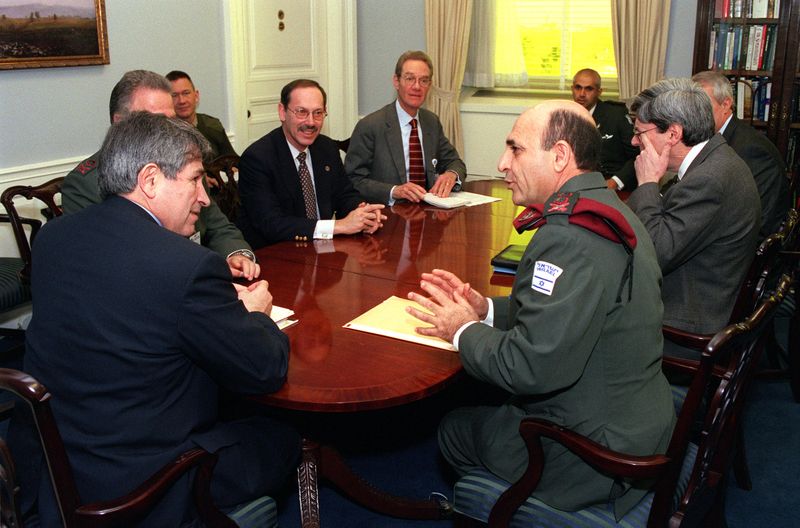New chairman of Kadima, Shaul Mofaz, said he would head the social protest this summer. Yet some think his economic-social statements are hollow. Support for this opinion comes from a group calling itself The Social Guard

Mofaz (right foreground) as Chief of Defense, meets with US Deputy Secretary of Defense Paul Wolfowitz (left), on Jan. 18, 2002. Photo by R. D. Ward
Newly crowned chairman Shaul Mofaz's resounding victory in the Kadima primary on Tuesday leaves no room for doubt about what is happening in the party. But the real battle – presenting an alternative to Prime Minister Benjamin Netanyahu – is just getting started.
From the few speeches he made during the campaign and his victory speech Tuesday night, Mofaz seems to be promoting a strong social agenda. Mofaz said earlier this week that he would head the social protest when it reemerges this summer, and thatIsraelis a power when it comes to defense but a social weakling.
Mofaz knows the social protest is one of the issues that will figure centrally in the next elections. Two weeks ago, at the height of the campaign, he walked over to student union leader Itzik Shmuli in the Knesset dining room and shook his hand. "When I am elected, you will be the first person I will invite to join me," Mofaz told him. Shmuli is one of the heads of last summer's protest and considered a surefire vote magnet.
A social agenda figured in Mofaz's victory speech, in which he described his childhood as a new immigrant, and the equal opportunity he received and that he wants to ensure for everyone. "We will change the equation and restore hope to Israelis," he said, adding, "Kadima will restore dignity to the working class."
Lapid showdown
But one of Mofaz's problems is that he is entering a political field that has already been largely taken over by others. To win the support of centrist voters disappointed with high-living expenses and inequality in shouldering society's burdens, he will have to face off against Labor chairwoman MK Shelly Yachimovich, and also Yair Lapid, whose slogan is "Show me the money."
Moreover, political pundits claim that Mofaz's economic-social statements are hollow. "He has been in politics for a decade and has done nothing in the social area, only in security," one said.
Support for this opinion comes from a group calling itself Hamishmar Hahevrati ("the social guard" ), which scrutinizes Knesset members' social action agendas, and which ranked him fifth from last in terms of social-mindedness among Kadima's 28 MKs in the last Knesset session. The MKs who supported him are also low on the list, as opposed to the lawmakers who supported Livni.
On Wednesday, Mofaz laid a wreath on the grave of Theodor Herzl and then went to the Western Wall.
He is also set to meet President Shimon Peres in the coming days and to obtain the appointment of opposition leader, which would grant him the privilege of regular meetings with the prime minister and the right to address the Knesset immediately after the prime minister. Netanyahu called Mofaz to congratulate him on his victory.
Among the changes Mofaz intends to make are to replace party officials associated with Livni with his own people, and to thoroughly scrutinize party finances to reduce its deficit.
Another question is how to involve the MKs who supported Livni. Some had already made clear they would accept Mofaz's leadership and even came to his victory speech. Mofaz was also in contact with them during his campaign and assured them they would be welcome the day after.
However, Mofaz will have to attain a gigantic victory in the general elections to reconstruct the number of Knesset seats that Kadima now has; any other scenario means there will not be room for everyone on the list, even before new members like Dan Haultz come in.
As long as there is no need for tough decisions, the party can appear one happy family. But the moment the race for positions start, Livni's people will likely be pushed to the back.
As things look now, most of them have nowhere to go. Many in the party welcomed as a unifying step the fact that MKs who supported Livni came to Mofaz's big night.
Others criticized the quick change. Livni ally Tzachi Hanegbi, who was one of the first to come to party headquarters, was scorned. "Tzachi flip-flopped like an omelet," one activist said. Another Kadima activist opted for a botanical metaphor, saying that faction chairwoman Dalia Itzik, who had supported neither candidate but had a place of honor on the dais next to Mofaz on victory night, "turned like a sunflower to the direction of the light."
Mofaz will have to decide whether Kadima will continue to hold the chairmanship of the Knesset Foreign Affairs and Defense Committee, or will take the chairmanship of the Economic Affairs Committee, which it has the right to do come the summer session. That would be the more suitable choice if the party wants to concentrate on economic legislation.
The best person for the job
The choice is largely one of picking the best person in Kadima for each job: MK Avi Dichter, a former Shin Bet security service chief who dropped out of the race for chairman and put his weight behind Mofaz, would be the perfect choice to head the Foreign Affairs and Defense Committee. However, Meir Sheetrit, who also considered running for party chairman but then supported Mofaz from the beginning, is a natural choice for the chairmanship of the Economics Committee.
But on the day after, most people are looking at the race's loser. In his victory speech Mofaz called on Livni to stay in the party, as did some party members. Livni, however, has not said what she intends to do. Her close associates say she has not decided.
And how will Mofaz's win affect Israeli politics? Some on the right say it will weaken Netanyahu, because Mofaz – as opposed to Livni – could grab votes from the prime minister.
On the left, some said Livni had previously taken votes from them, and Mofaz's election would strengthen them.
"Livni created a kind of distortion that pulled votes from the left. Now things will be logical again," the activist said.
Although outwardly Likud members say Kadima is at the end of the road, privately some are concerned that Mofaz could hurt them, taking critical seats that could change the balance of power.
"Everything depends on the opinion polls. If he doesn't reach at least 15 seats in the first poll, he has a problem," a senior Likud figure said, hopefully.
First published in Haaretz, 29.3.2012

